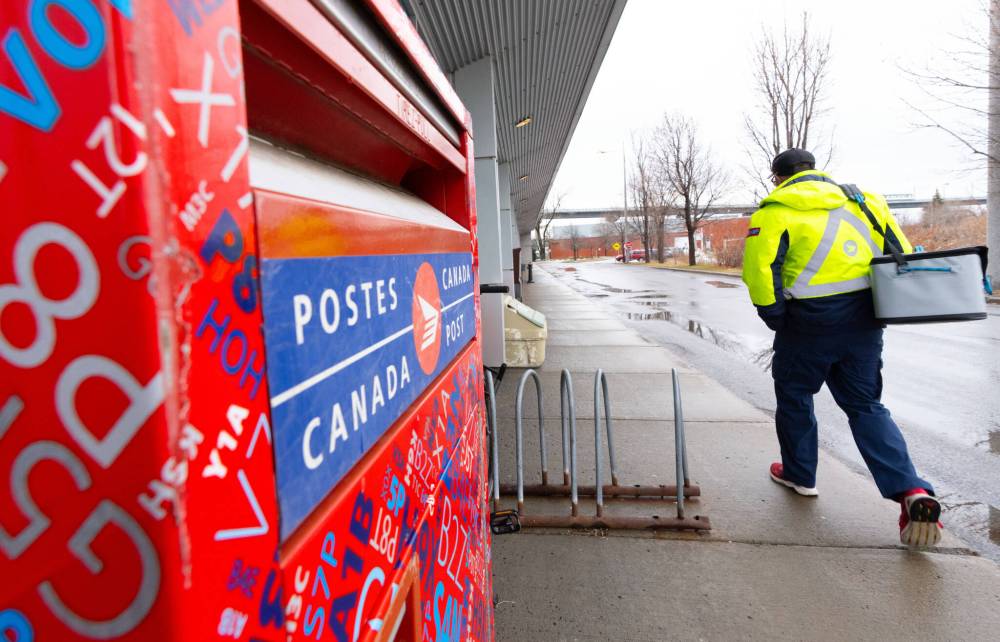Postal workers begin voting on final contract offers
Advertisement
Read this article for free:
or
Already have an account? Log in here »
We need your support!
Local journalism needs your support!
As we navigate through unprecedented times, our journalists are working harder than ever to bring you the latest local updates to keep you safe and informed.
Now, more than ever, we need your support.
Starting at $15.99 plus taxes every four weeks you can access your Brandon Sun online and full access to all content as it appears on our website.
Subscribe Nowor call circulation directly at (204) 727-0527.
Your pledge helps to ensure we provide the news that matters most to your community!
To continue reading, please subscribe:
Add Brandon Sun access to your Free Press subscription for only an additional
$1 for the first 4 weeks*
*Your next subscription payment will increase by $1.00 and you will be charged $20.00 plus GST for four weeks. After four weeks, your payment will increase to $24.00 plus GST every four weeks.
Read unlimited articles for free today:
or
Already have an account? Log in here »
Hey there, time traveller!
This article was published 21/07/2025 (186 days ago), so information in it may no longer be current.
More than 53,000 Canada Post employees began voting Monday on the organization’s final contract offers.
The result of the vote could bring an end to nearly two years of labour unrest or plunge the Crown corporation further into uncertainty and financial strain.
The vote, overseen by the Canada Industrial Relations Board, will run through Aug. 1 and is open to members of both the urban and rural/suburban mail-carrier bargaining units represented by the Canadian Union of Postal Workers.

More than 53,000 Canada Post employees began voting Monday on the Crown corporation's final contract offers. (The Canadian Press files)
CUPW officials are reportedly urging members to reject the proposal.
The offers, according to a document obtained from the Crown corporation, would include wage increases of six per cent in year one, three per cent in year two, two per cent in year three and two per cent in year four — for 13.59 per cent compounded.
The proposal would also maintain workers’ “defined benefit pension and industry-leading job security,” the document says, as well as create new part-time positions with predictable hours and benefits.
The vote will be confidential, Canada Post spokesperson Jon Hamilton told the Sun on Monday.
“We hope our employees see these offers provide certainty for the road ahead and vote yes to make them their new collective agreements effective until Jan. 31, 2028,” he said.
“This vote comes after 19 months of negotiations … and two rounds of strike activity by the union that have impacted employees, our customers and boosted our operating losses to $10 million a day in June.”
Canada Post maintains that the offers reflect both the fiscal realities the organization is facing and the need to remain competitive in a rapidly evolving delivery landscape, it said in a statement last week.
Since 2018, it said, the corporation has recorded more than $3.8 billion in pre-tax losses, including an operating loss of nearly $1.3 billion last year. The final report from the Industrial Inquiry Commission, released in May, describes the Crown corporation as effectively insolvent and warns that “merely tinkering with the status quo is not an option.”
As workers cast their ballots, pressure is building from small businesses, a critical stakeholder.
A new report by the Canadian Federation of Independent Business warns that nearly two in three small businesses could permanently stop using Canada Post services if another strike occurs after the vote, CFIB regional spokesperson Brianna Solberg said.
“The constant back-and-forth with strike mandates is driving away one of Canada Post’s last remaining profitable customer groups, small businesses,” she said.
The CFIB’s research found that while four in five small businesses still rely on Canada Post, many are actively seeking alternatives. During the 2024 strike, the group said, 13 per cent of small businesses permanently left Canada Post.
CFIB said most small businesses use Canada Post for sending cheques and other letter mail, with many citing low cost and convenience as the main advantages. However, they also report that reliability and customer service have ranked lower in recent years.
The financial impact of these disruptions is substantial.
CFIB estimates that the 2024 strike cost small businesses between $75 million and $100 million each day. In response, a majority of businesses shifted to digital solutions, turned to private couriers, or simply delayed mail, a shift that has proven difficult to reverse.
Canada Post’s share of the parcel delivery market, CFIB said, has dropped from 62 per cent in 2019 to just 24 per cent today, making it clear that regaining trust and market share will require more than just labour peace — it will require systemic change.
» aodutola@brandonsun.com
» X: @AbiolaOdutola
